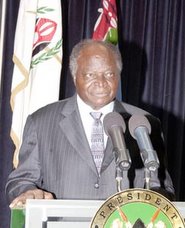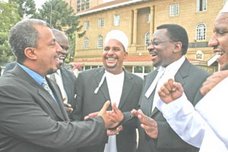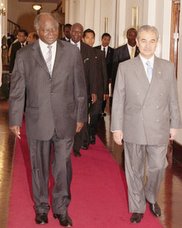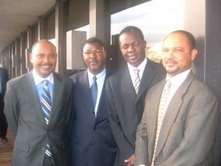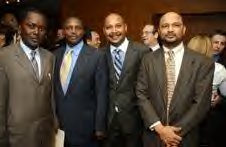
_______________
BOLD Scripts...by Omar Ahmed Ali
It is now official that there is no intra-party democracy politics in Kenya. In this day and age, at a closer look of what is going on within the supposedly two major strong political organizations, Orange Democratic Movement Kenya and Narc Kenya, it becomes apparent that democracy is foreign and not a subject matter when it comes to participatory politics in the country.
Let me elaborate by first looking at ODM-K which is seeking to remove President Mwai Kibaki from power. The party’s formed the Fred Gumo Council of Elders in their effort to shepherd unity of their party before and after the party’s presidential nomination that is poised to be potentially explosive. In the Council’s effort to avoid the potential fallout of the party after the presidential nomination, they have come up with a plan that will "take care of the party’s presidential nomination losers." The so-called party elders “want to ensure that even those who fail to clinch the presidential nomination would not be left out of the power-sharing formula.” One would have thought that party losers have an obligation to support the winners, but I guess not in Kenya.
Sad, but true, the elders say they believe that if the nomination losers are guaranteed other senior positions should ODM-K emerge victorious in the General Election, they were likely not to defect to other parties. The ODM-K leading lights-cum-presidential nomination aspirants are so power-hungry to the extent that they unashamedly have the audacity to be in agreement of the creation of extra and equally senior ministerial positions for themselves even if they are not popular to win the nomination. These individuals are banking on the ethnic communities’ they hail from as the basis of the "right" to be given those senior positions of their party’s government.
It is reported that, ODM-K’s government will have a prime minister, two vice presidents and two deputy prime ministers. We were not told how many ministers and assistant ministers. One wonders what benefits such positions would be to the ordinary Kenyans who are struggling to put food on the table and shelter to their families. I wonder what position Ms Nazlin Umar will be given in the ODM-K government, Prime Minister or an assistant minister. Your guess is as good as mine.
Then you have Narc Kenya, the presumptive President Mwai Kibaki’s re-election political vehicle. In order to avoid fallout on their side, this new party formed by government allied MPs was forced to shelve any plans to conduct national elections. The party hierarchy, which is mainly restricted to Members of Parliament, assistant ministers and ministers led by Vice President Moody Awori as the party Deputy Leader, has opted for selection, instead of the election, of the National Executive Council (NEC) membership.
The NEC is the political party’s top organ in Kenya’s political parties’ structures; it seems to me that one can easily be a member of such a party organ without being elected but merely selected.
Even the supposedly selected few of Narc- K were not named at the eleventh hour of the announcement (appointments) because of yet another fallout that was believed would have happened had the Vice President gone ahead to name the line-up. It is alleged the party is in Catch 22 bind, as some MPs confided that naming of the new officials by the VP would plunge the party into deeper political quagmire that finds itself already in. They compelled Awori to note: “Due to the huge interest, the period set aside by the Council for two weeks is inadequate. I have been given two more weeks to complete the consultations.”
It seems to me that Narc-K constitution, just like ODM-K, favours sitting MPs hence the party board composition that is to pick (or would have picked) the national official is definitely bound to be biased.
Although, I have only discussed the masaibu ( woes) of ODM-K and Narc- K, but the story line is the same in other political parties, be it Ford Kenya, NARC, NPK and SAFINA, the list is endless. For instance, the ruling party NARC never conducted elections in the four years plus the party has been in power.
What is going on in Kenya when it comes to the management of political parties is sad and pathetic. It will interesting to see what happen in ODM -K as far as the presidential nomination exercise is concerned. As for the Narc-K we shall wait and see the new line-up of the NEC. Two weeks is a very short period of time Mr Vice President.
***
In support of Commish Ali
Were the rules of engagement in the coming General Election as laid down by the no nonsense chief of police Maj Gen Hussein Ali harsh and draconian? The answer (with capital letters) is "No." If you ask me, I think it was high time for Commissioner of Police Ali to put the politicians on notice for this year’s General Election campaign. Kenyans can say whatever they want but it is without a doubt that such orders were long overdue. This is not in defence of Kibaki but in defence of the institution, the Presidency.
It has become a tendency for the local politicians to publicly abuse (in taking advantage of the freedom of speech) the President as an individual and the institution. This tendency needed to be stopped once and for all. The country doesn’t need the legislature to pass such a decree. The law is already in place stipulating that abusing the sitting Head of State is an offence; one would be breaking the law. There is a compelling need to remind politicians the need to respect the institution of the presidency, especially as we approach the election season.
Ali was not making laws for the country as it is alleged by Mutula Kilonzo. The Kanu Shadow Attorney-General himself once a presidential lawyer was quoted to have noted: “Ali has no business creating new laws for the country. With or without Ali, we will continue to criticise Kibaki.”
Criticizing and insulting are two different things and Kilonzo as a trained and experience legal mind ought to know difference. Ali is not taking the country back to the old days of one party rule and political intolerance as it is alleged. Instead he is trying to bring sanity to the political arena specific to the institution of the presidency and for the benefit of the country as things are getting out of hand.
It is better to remind people that Assistant ministers Kalembe Ndile, Asman Kamama and Dunson Mungatana do not represent Narc-K as a political party although they are known to be associated with the political organization. These individuals in opposing Ali’s rules spoke as individual politicians and not as Narc-K as a political outfit as it is supposed by the press. Simply put they represent themselves and at best their rural constituencies.
If you ask me, Kibaki is no saint but he is no dictator either. As the country’s Head of State, he deserves respect as a good and hard working democratically elected leader and the president of our country.
People can say whatever they want but the fact remain that Ali’s directive does not infringe on the constitutional right of any Kenyan. Ali has no history of playing politics since he assumed the office of the police commissioner and as such he cannot be accused of doing so now.
****
This is a very cheeky invitation!
The Langa’ta legislator and ODM-K presidential nomination candidate Raila Odinga is reported to have invited 4,000 guests to attend the launch of his presidential vision. According the media reports more than one thousand invitation cards have already been sent to all the sitting MPs and the supposedly who-is-who in and out of the government for the event that is poised to take place at the KICC on May 6, 2007.
This is all well and good for Raila and his campaign team. What is not well and good and perhaps imprudent is the fact that the former Roads and Public Works minister also invited his former boss, President Mwai Kibaki to the event. In addition, the one time Kanu Energy Minister invited to the occasion are his own rivals in the ODM-K presidential nomination contest.
This is very comical and funny to say the very least. Why would Raila invite his own rivals to the launch of his presidential vision and to make the matter worse, he unsophisticatedly invites the person he intends to dislodge in his bid. I think the illustrious handlers and scholarly Raila’s advisers failed him in this regard.
I am sure ODM Kenya presidential hopefuls, in an effort to secure a safe landing spot in an eventual Raila presidency (remember the prime minister, two vice president and two deputy premiers positions in an ODM Kenya government) will have to attend the function, President Kibaki will not, and I repeat will not attend the function. It looks good in paper to have invited Kibaki, but in reality Raila knows he was only being comical.
There is neither political mileage nor it’s cleverly to invite Kibaki to your function Mr Raila. You are politician who has travelled in different parts of the democratic world, and I am assure you are aware of the way genuine politics is played and or conducted.
___________________
Sources: Sunday Times
April 29, 2007
http://www.timesnews.co.ke/29april07/editorials/bscripts.html
It is now official that there is no intra-party democracy politics in Kenya. In this day and age, at a closer look of what is going on within the supposedly two major strong political organizations, Orange Democratic Movement Kenya and Narc Kenya, it becomes apparent that democracy is foreign and not a subject matter when it comes to participatory politics in the country.
Let me elaborate by first looking at ODM-K which is seeking to remove President Mwai Kibaki from power. The party’s formed the Fred Gumo Council of Elders in their effort to shepherd unity of their party before and after the party’s presidential nomination that is poised to be potentially explosive. In the Council’s effort to avoid the potential fallout of the party after the presidential nomination, they have come up with a plan that will "take care of the party’s presidential nomination losers." The so-called party elders “want to ensure that even those who fail to clinch the presidential nomination would not be left out of the power-sharing formula.” One would have thought that party losers have an obligation to support the winners, but I guess not in Kenya.
Sad, but true, the elders say they believe that if the nomination losers are guaranteed other senior positions should ODM-K emerge victorious in the General Election, they were likely not to defect to other parties. The ODM-K leading lights-cum-presidential nomination aspirants are so power-hungry to the extent that they unashamedly have the audacity to be in agreement of the creation of extra and equally senior ministerial positions for themselves even if they are not popular to win the nomination. These individuals are banking on the ethnic communities’ they hail from as the basis of the "right" to be given those senior positions of their party’s government.
It is reported that, ODM-K’s government will have a prime minister, two vice presidents and two deputy prime ministers. We were not told how many ministers and assistant ministers. One wonders what benefits such positions would be to the ordinary Kenyans who are struggling to put food on the table and shelter to their families. I wonder what position Ms Nazlin Umar will be given in the ODM-K government, Prime Minister or an assistant minister. Your guess is as good as mine.
Then you have Narc Kenya, the presumptive President Mwai Kibaki’s re-election political vehicle. In order to avoid fallout on their side, this new party formed by government allied MPs was forced to shelve any plans to conduct national elections. The party hierarchy, which is mainly restricted to Members of Parliament, assistant ministers and ministers led by Vice President Moody Awori as the party Deputy Leader, has opted for selection, instead of the election, of the National Executive Council (NEC) membership.
The NEC is the political party’s top organ in Kenya’s political parties’ structures; it seems to me that one can easily be a member of such a party organ without being elected but merely selected.
Even the supposedly selected few of Narc- K were not named at the eleventh hour of the announcement (appointments) because of yet another fallout that was believed would have happened had the Vice President gone ahead to name the line-up. It is alleged the party is in Catch 22 bind, as some MPs confided that naming of the new officials by the VP would plunge the party into deeper political quagmire that finds itself already in. They compelled Awori to note: “Due to the huge interest, the period set aside by the Council for two weeks is inadequate. I have been given two more weeks to complete the consultations.”
It seems to me that Narc-K constitution, just like ODM-K, favours sitting MPs hence the party board composition that is to pick (or would have picked) the national official is definitely bound to be biased.
Although, I have only discussed the masaibu ( woes) of ODM-K and Narc- K, but the story line is the same in other political parties, be it Ford Kenya, NARC, NPK and SAFINA, the list is endless. For instance, the ruling party NARC never conducted elections in the four years plus the party has been in power.
What is going on in Kenya when it comes to the management of political parties is sad and pathetic. It will interesting to see what happen in ODM -K as far as the presidential nomination exercise is concerned. As for the Narc-K we shall wait and see the new line-up of the NEC. Two weeks is a very short period of time Mr Vice President.
***
In support of Commish Ali
Were the rules of engagement in the coming General Election as laid down by the no nonsense chief of police Maj Gen Hussein Ali harsh and draconian? The answer (with capital letters) is "No." If you ask me, I think it was high time for Commissioner of Police Ali to put the politicians on notice for this year’s General Election campaign. Kenyans can say whatever they want but it is without a doubt that such orders were long overdue. This is not in defence of Kibaki but in defence of the institution, the Presidency.
It has become a tendency for the local politicians to publicly abuse (in taking advantage of the freedom of speech) the President as an individual and the institution. This tendency needed to be stopped once and for all. The country doesn’t need the legislature to pass such a decree. The law is already in place stipulating that abusing the sitting Head of State is an offence; one would be breaking the law. There is a compelling need to remind politicians the need to respect the institution of the presidency, especially as we approach the election season.
Ali was not making laws for the country as it is alleged by Mutula Kilonzo. The Kanu Shadow Attorney-General himself once a presidential lawyer was quoted to have noted: “Ali has no business creating new laws for the country. With or without Ali, we will continue to criticise Kibaki.”
Criticizing and insulting are two different things and Kilonzo as a trained and experience legal mind ought to know difference. Ali is not taking the country back to the old days of one party rule and political intolerance as it is alleged. Instead he is trying to bring sanity to the political arena specific to the institution of the presidency and for the benefit of the country as things are getting out of hand.
It is better to remind people that Assistant ministers Kalembe Ndile, Asman Kamama and Dunson Mungatana do not represent Narc-K as a political party although they are known to be associated with the political organization. These individuals in opposing Ali’s rules spoke as individual politicians and not as Narc-K as a political outfit as it is supposed by the press. Simply put they represent themselves and at best their rural constituencies.
If you ask me, Kibaki is no saint but he is no dictator either. As the country’s Head of State, he deserves respect as a good and hard working democratically elected leader and the president of our country.
People can say whatever they want but the fact remain that Ali’s directive does not infringe on the constitutional right of any Kenyan. Ali has no history of playing politics since he assumed the office of the police commissioner and as such he cannot be accused of doing so now.
****
This is a very cheeky invitation!
The Langa’ta legislator and ODM-K presidential nomination candidate Raila Odinga is reported to have invited 4,000 guests to attend the launch of his presidential vision. According the media reports more than one thousand invitation cards have already been sent to all the sitting MPs and the supposedly who-is-who in and out of the government for the event that is poised to take place at the KICC on May 6, 2007.
This is all well and good for Raila and his campaign team. What is not well and good and perhaps imprudent is the fact that the former Roads and Public Works minister also invited his former boss, President Mwai Kibaki to the event. In addition, the one time Kanu Energy Minister invited to the occasion are his own rivals in the ODM-K presidential nomination contest.
This is very comical and funny to say the very least. Why would Raila invite his own rivals to the launch of his presidential vision and to make the matter worse, he unsophisticatedly invites the person he intends to dislodge in his bid. I think the illustrious handlers and scholarly Raila’s advisers failed him in this regard.
I am sure ODM Kenya presidential hopefuls, in an effort to secure a safe landing spot in an eventual Raila presidency (remember the prime minister, two vice president and two deputy premiers positions in an ODM Kenya government) will have to attend the function, President Kibaki will not, and I repeat will not attend the function. It looks good in paper to have invited Kibaki, but in reality Raila knows he was only being comical.
There is neither political mileage nor it’s cleverly to invite Kibaki to your function Mr Raila. You are politician who has travelled in different parts of the democratic world, and I am assure you are aware of the way genuine politics is played and or conducted.
___________________
Sources: Sunday Times
April 29, 2007
http://www.timesnews.co.ke/29april07/editorials/bscripts.html

















